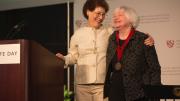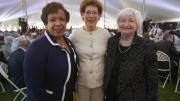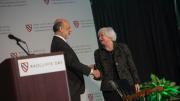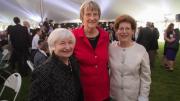Inequality—in wealth, race, gender, domestically and across the globe—weighed heavily in the minds of this year’s Commencement speakers. It seemed fitting that the week’s activities concluded with a program Friday at the Radcliffe Institute honoring Federal Reserve chair Janet Yellen, the recipient of this year’s Radcliffe Medal, and one of today’s most publicly vocal advocates of shared prosperity. Yellen has been unapologetic in her view that promoting broadly shared wealth is inherent in the Fed’s mandate, a role which has cemented her leadership in the public conversation on inequality (and sometimes has provoked the ire of conservative lawmakers).
“Consistently Prescient”
Radcliffe Yard appeared to swell beyond its modest size to accommodate the hundreds of alumnae, from class years as early as 1939, who arrived at the Radcliffe Day luncheon to hear Yellen speak and accept her award. In a question-and-answer session led by Beren professor of economics N. Gregory Mankiw, Yellen reflected on her love for economics, her formative relationship with prominent economist James Tobin ’39, Ph.D. ’47, JF ’50, LL.D. ’95, her adviser in graduate school, and her long career in the Federal Reserve system. She also dropped a piece of policy news: “I’ve been told that a bunch of money managers in New York have delayed their trip to the Hamptons this afternoon so they could listen to your talk here today,” Mankiw joked expectantly. “Do you want to tell us anything about monetary policy?” Stressing, as always, a need for caution, Yellen said the Fed may raise interest rates “in the coming months” if the economy continues to improve at current levels—contributing to speculation that rates would go up this summer. In December, the Fed increased interest rates for the first time since before the recession, signaling confidence in the economy’s recovery, though not without intense criticism from economists who believed it was too early for a rate hike, and a subsequent fall in stock values.
Moments earlier, former Fed chair Ben Bernanke ’75 had praised his colleague and close friend not just for her cautious temperament—a minimum requirement for anyone hoping to lead the central bank—but also for her willingness to take bold action in difficult circumstances. In the years leading up to the Great Recession, when she led the Federal Reserve Bank of San Francisco, Yellen had predicted the financial crisis. “She was consistently prescient,” Bernanke remembered, “about the peril that an imploding financial system posed for the economy….I recall how often in the meetings of the Federal Open Market Committee [which sets monetary policy], when it came Janet’s turn to talk, everyone would go silent.”
The Human Impact of Economic Policy
Yellen’s discussion with Mankiw centered, fittingly, on the human impact of economic policy. “I’d always been interested in math...and I saw economics as a field that uses math and quantitative techniques, but for an important social purpose: advancing human welfare, and understanding problems that keep people from fulfilling their lives,” she said, explaining what drew her to economics. “Although I don’t think anyone’s ever invented a better economic system than capitalism,” she conceded, “it is capable of breakdowns.” She remembered Tobin, a Keynesian economist, as an “inspiration,” with “a moral compass that pointed straight north.”
Tobin’s humanizing influence left a permanent impression on Yellen: “Sometimes economists are accused of working on highly mathematical models that have questionable applicability. For Tobin, that was never the case. Economics was always important because of the policy implications of it, the potential to make people’s lives better,” she explained. He “lived through the Depression, saw the horrific economic toll it took on our nation...and he was determined to make sure our country never suffered through such a situation again when there were policy tools that could be deployed. That is exactly the focus that I’ve had throughout my career.”
The Welfare of Ordinary Americans
Yellen’s attention to the welfare of ordinary Americans appears to have developed earlier still. Her father, a doctor, saw many patients who were dock workers, explained Radcliffe Institute dean Lizabeth Cohen in her welcoming remarks at the luncheon. “These working families made a deep impression on the young Janet, because dock work by its nature was vulnerable to economic fluctuation, which meant frequent periods of unemployment. From her earliest memories, she understood that its effects were, in her words, ‘simply terrible on the mental and physical health of workers, on their marriages, and on their children.’ The human effects of the labor market—and the urge to do something about them—would go on to shape Yellen’s remarkable career.”
In the 1980s, then a professor at the University of California, Berkeley, Yellen and her husband George Akerlof contributed influential work on efficiency wages, or wages paid by employers that are above the market rate, in apparent contradiction to classical economic theory. Their paper argued that “it may be in an employer’s economic interest to pay higher wages because workers labor harder, and do better work, when they feel valued,” Cohen said. “Unless you take into account both workers’ and employers’ non-rational motivations—including emotions—you will not be able to predict or explain the labor market.” Insights like these now are standard fare in introductory economics classes, and have formed the foundation of behavioral economics, a subfield concerned with the influence of human psychology on economic decisions.
“With her values, her intellect, and her calm leadership, Yellen steers our economy toward shared prosperity,” Cohen said. “As she has pointed out time and again, a well supervised financial sector fuels job creation, innovation, and inclusive economic growth. In turn, households capable of meeting financial goals, such as home ownership, retirement, and college savings, are better able to boost markets.”
Mankiw invited Yellen to comment on how the Fed might have better handled the recession, though she largely declined, instead applauding Bernanke for his leadership during the financial crisis in the face of much criticism. In the wake of the recession, she said, the Fed has improved its hand in financial regulation a great deal: “We’re focused on systemic risk, we’re focused on financial stability, and wanting to spot emerging conditions that could result in another financial crisis. We have a better understand of how to look for those conditions.”
Yellen accepted the Radcliffe Medal, with a look of sheepish gratitude, after her interview with Mankiw. The honor is awarded annually to an individual, usually a woman, who has made a transformative impact on society. Previous honorees include Supreme Court Justice Ruth Bader Ginsburg last year, Harvard president Drew Faust, and feminist organizer Gloria Steinem.
In 2013, when Yellen was considering whether she would accept her nomination as Fed chair, Bernanke recalled, “she was also thinking about the historic significance of being the first woman in this prominent post.” He paused, to much applause, then continued: “Janet well understood that by taking this position and applying her considerable talents, she could provide a valuable role model to future generations of young women, who might otherwise not engage with economics or economic policy-making. That is itself a great contribution.” Yellen has been named by various organizations not only the most influential woman in the world, but indeed one of the most influential people—a distinction that many alumnae gathered in Radcliffe Yard may never have imagined a woman would hold.
Read the separate report on the Radcliffe Day morning panel discussion about economic prosperity and equality.












